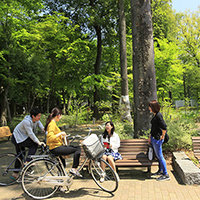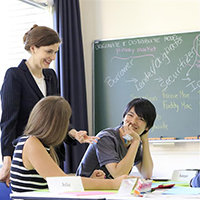NEWS
Message from International Christian University (ICU) , No1
Update: July 10, 2020
While obliged to avoid close in-person contact amid the abnormal circumstances, we have decided to issue this E-Newsletter to stay in touch with you.
This E-Newsletter is mainly for teachers and counselors involved in secondary education, but is open to individuals who wish to subscribe to it.
Please fill in the form below and click on the "Subscribe to this E-Newsletter" button.
Message from ICU , No.1(May 1, 2020)
Liberal Arts
- A System of Learning, a Lifestyle -
President Shoichiro Iwakiri
 I became President of ICU in April. My specialty is French literature. At present, I don't teach courses, but in my 2017 French Novel course, my students and I read Albert Camus's La Peste (1947) in the original.
I became President of ICU in April. My specialty is French literature. At present, I don't teach courses, but in my 2017 French Novel course, my students and I read Albert Camus's La Peste (1947) in the original.
The novel portrays justice, solidarity and resistance in the isolated Algerian city of Oran in the grip of the plague. It has found a renewed readership in present-day Japan amidst the spread of the coronavirus. Many Japanese also turned to the book in the wake of the Great East Japan Earthquake, as the story provides ways to stay grounded amidst a calamity, guides our behavior, and portrays characters we deeply empathize with.
Several months into the plague, with the end nowhere in sight, Oran's municipal clerk Grand, one of the protagonists, says to Doctor Rieux, "I know I look a quiet sort, just like anybody else. But it's always been a terrible effort only to be―just normal."
When daily life has been disrupted, creating a semblance of normalcy requires effort, the inner strife usually invisible to others. Camus highlights how the fundamental human condition reveals itself in the way we go about our lives. Rieux chronicles the plague, "to state quite simply what we learn in time of pestilence: that there are more things to admire in men than to despise."
Camus conveys his message through the words of the doctor, urging us to empathize with the suffering, do our best in fighting the calamity, endure hardship while never losing the capacity for love. "It's a matter of common decency. That's an idea which may make some people smile, but the only means of fighting a plague is―common decency."
*
 Having the means to confront an adversity is a great advantage. I believe we have this common decency at ICU for humanity and education that supports us in facing challenges like the coronavirus pandemic.
Having the means to confront an adversity is a great advantage. I believe we have this common decency at ICU for humanity and education that supports us in facing challenges like the coronavirus pandemic.
Japanese universities have presently shifted from in-person to online learning. (Specialists call it emergency remote teaching, as opposed to authentic online education.) Amidst the unprecedented confusion, ICU was quick to implement measures to cope with the situation, as we know what is most important for our students. We are committed to continue offering our liberal arts education in the best way possible.
 Since its founding in 1953, ICU offers a system of education in liberal arts. The university upheld this tradition with its academic, international and Christian commitments, while education oriented to more specialization gained traction after the University Establishment Standards was amended in 1991 by the Ministry of Education. In the years since, the backlash against career-focused education has motivated more institutions to adopt the liberal arts model. ICU has been steadfast in pursuing its liberal arts philosophy, imbuing students with a broad background in diverse disciplines and in-depth knowledge in a chosen major. Our policy has been to encourage dialogue with emphasis on critical thinking, founded on bilingualism in Japanese and English, for service to God and mankind.
Since its founding in 1953, ICU offers a system of education in liberal arts. The university upheld this tradition with its academic, international and Christian commitments, while education oriented to more specialization gained traction after the University Establishment Standards was amended in 1991 by the Ministry of Education. In the years since, the backlash against career-focused education has motivated more institutions to adopt the liberal arts model. ICU has been steadfast in pursuing its liberal arts philosophy, imbuing students with a broad background in diverse disciplines and in-depth knowledge in a chosen major. Our policy has been to encourage dialogue with emphasis on critical thinking, founded on bilingualism in Japanese and English, for service to God and mankind.
*
Liberal arts is a system in education, cultivated over a number of years. The process consists of building a style of thinking and behavior in individuals. This can be called a liberal arts habitus : structured norms or tendencies that guide behavior and thinking. ICU nurtures students who take action on their own initiative under any circumstances. They know what is most important for humankind and fight to protect it. They respect other cultures and individuals and can create a new order amidst conflict and confusion.
 Liberal arts is not a set of fixed skills and knowledge. It is a flexible system that takes in myriad variables. Vigorous engagement with not only the beautiful, the true, the sacred, the good, but also the different, the unworthy, the discriminated, and the rejected, and even the abominable, nurtures a resilient spirit that can create a new framework for coexistence. This mindset creates a style in thinking and behavior for learning in college and beyond.
Liberal arts is not a set of fixed skills and knowledge. It is a flexible system that takes in myriad variables. Vigorous engagement with not only the beautiful, the true, the sacred, the good, but also the different, the unworthy, the discriminated, and the rejected, and even the abominable, nurtures a resilient spirit that can create a new framework for coexistence. This mindset creates a style in thinking and behavior for learning in college and beyond.
As the new President of ICU, I would like to emphasize that the education we offer initiates a lifestyle. Through this E-Newsletter, I hope to convey that our liberal arts education system develops the potential for a deep understanding of society, humankind, and nature that enriches students' lives.
- Message to All New Students April 2020 Spring Matriculation
Address by Shoichiro Iwakiri, President
- Measures taken by ICU in response to the emergency declaration Message from the President
Profile
Professor Shoichiro Iwakiri was born in 1959 in Miyazaki Prefecture. He acquired his master's degree in literature from the University of Tokyo Graduate School, and a doctorate from the Université Paris 7 (DEA). He has translated plays and is also a poet. He started teaching at ICU as assistant professor in 1996 and became professor in 2007. Prior to becoming President in 2020, he was Assistant Dean of the College of Liberal Arts, Director of the Admissions Center and Dean of the College of Liberal Arts. He specializes in modern and contemporary French poetry. With his Japanese translations of Caligula by Albert Camus and L'Alouette by Jean Anouilh staged by Yukio Ninagawa , Professor Iwakiri was the recipient of the 15th Yuasa Yoshiko Prize (Section of Drama Translation).。
▶Office of the President
